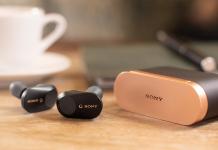One of the main downsides of any wearable is the execrable battery life, and until scientists will provide us with sources of infinite power, we need to find solutions to keep our gadgets up and running. Lenovo thought that a battery that’s positioned around your neck should do the trick for its newly announced smart glasses.
Showcased a fortnight ago, the Lenovo smart glasses are this Chinese computing giant’s first step in the wearable tech industry. In terms of popularity, smart glasses are not as huge as smartwatches, but that doesn’t mean that manufacturers shouldn’t look for ways to make them unique. In Lenovo’s case, one of the innovations is represented by the neck battery, which adds another wearable item to the glasses. Since its capacity is larger than in the case of say Google Glass, the stand-by time should be considerably longer.

On the upside, Lenovo’s smart glasses can attached to prescription spectacles, as they don’t have a frame of their own. In terms of design though, it probably would’ve been better had they made the smart glasses a bit more discreet. The bulkiness does not translate into a heavy wearable, but it still might be a bit cumbersome to wear them.
As the operating system, these smart glasses run Android 4.0.4, which is handled quite well by the 1GHz dual-core CPU. Other than that, not much is known about the technical specs of this gadget.
Chen Xudong, Lenovo senior VP, said that “Right now there are too many kinds of devices you can develop for the Internet of Things. It’s too rich. Not one company can do it all.” The NBD platform developed by Lenovo will help the company’s partners to manufacture devices for the Internet of Things, while also providing them with funding and hardware research. Chen added that “We hope to use Lenovo’s advantages to combine with innovators. This platform can help them quickly start selling products, and create a supply chain for the market.”
M100, as Lenovo’s smart glasses developed in collaboration with Vuzix are called, should launch in August or September in China. The price of approximately $1,300 is a bit smaller than of Google Glass, but it’s still a bit steep for people looking to buy their first wearable.
Be social! Follow Walyou on Facebook and Twitter, and read more related stories about the Samsung Tizen OS smart glasses, and the Atheer One smart glasses that enable 3D interaction with Android apps.










